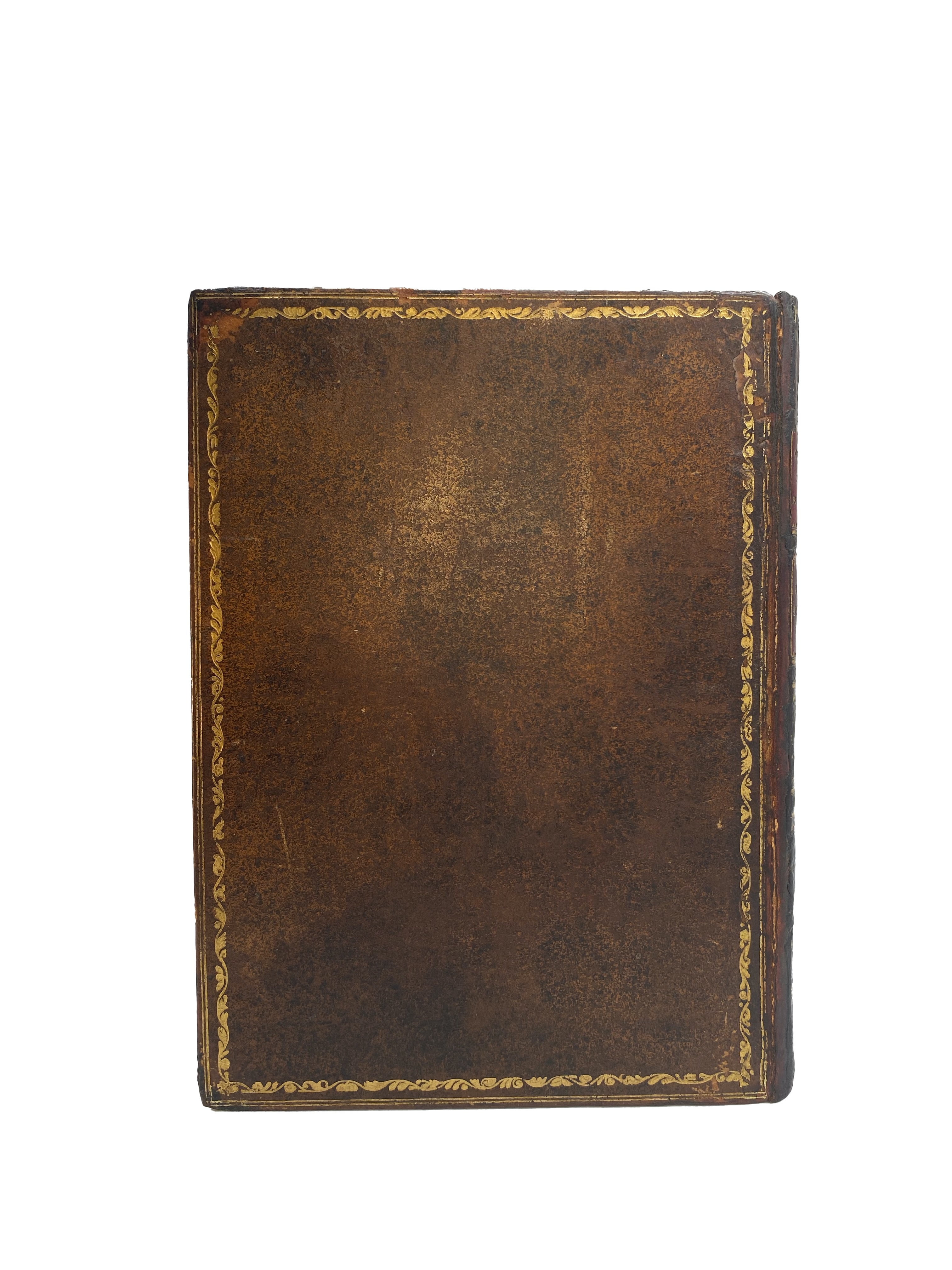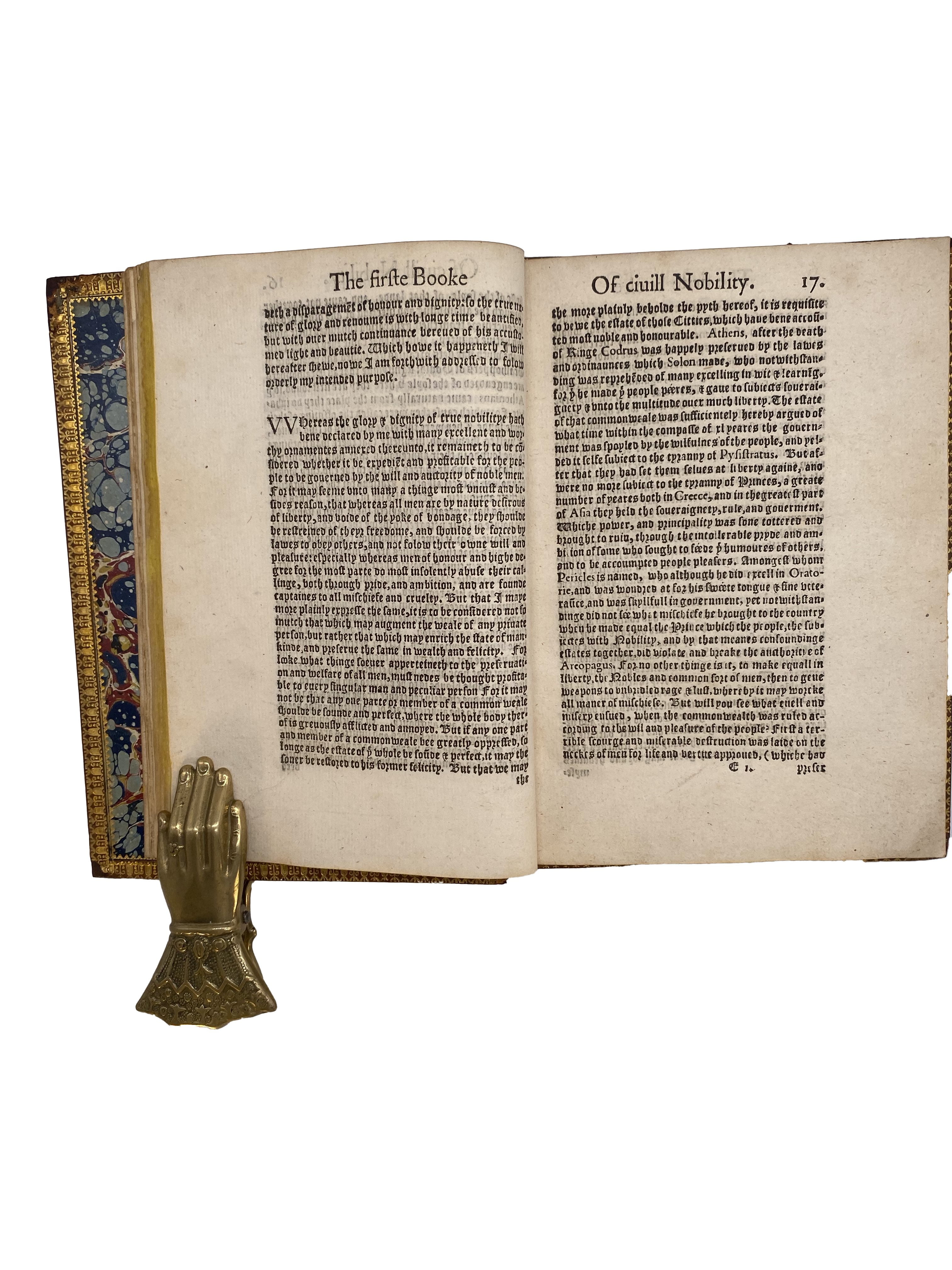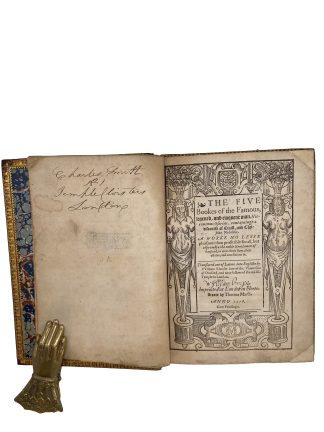OSÓRIO, Jerónimo
The fiue bookes …contayninge a discourse of ciuill, and Christian nobilitie. …
London, In Fleetestreate by Thomas Marsh, Anno 1576£6,500.00
FIRST EDITION thus. 4to. ff. [viii], 110. a-b , A-2D , 2E². First blank but for two lines of ornaments and signature-mark “A1.” Black letter, some Italic and Roman. Title within charming woodcut border, Thomas Marsh’s monogram below, white on black criblé and historiated initials, typographical ornaments, contemporary autograph of ‘William Greye’ on title in an early hand repeated on verso with motto ‘durum patientia frango’, and first page of text. ‘Charles Smith Temple Cloisters London’ in C19th hand on verso of first blank. Light age yellowing, small tear repaired in text of R4 just affecting a few letters, blank corners of A2-A4 neatly restored, S3 with original paper flaw in blank margin, small stain in blank margins towards end. A very good copy with wide margins, in early19th century speckled calf, covers bordered with gilt rules, rebacked, original spine laid down, gilt ruled in compartments with vase fleurons gilt at centres, red morocco labels gilt, inner dentelles richly gilt, all edges yellow.
Very rare first edition of the first translation into English of Jerónimo Osório’s ‘De nobilitate civili et christiana’ by William Blandie. The De nobilitate is an important work on political and social theory, the first work by the noted Portuguese humanist; it was first published in Lisbon, in 1542, having been written by Osório when he was 30 and studying Hebrew and theology at Bologna University. Osorio, known to contemporaries as the “Cicero of portugal”, here contends that men inherit their virtues and that consequently the ennobling characteristics of justice, courage and liberality cannot possibly appear in a man of humble origin.
William Grey was probably the younger son of the English baron and military commander, also called William Grey (1508/9-1562), 13th Baron Grey de Wilton. The Latin motto ‘durum patientia frango’ (‘with patience I overcome difficulty’) is the motto of the Scottish clan Muir. The motto’s connection to Grey is unclear, although Scotland remained a significant place to the family. Grey senior served as head of the army in the Scottish Wars of the 1540s, suffering serious injuries later resulting in him being knighted.
“Osorio, writing in the De Nobilitate, insisted the the pursuit of such ‘titles of honour and dygnyty’ with the aim of winning popular acclaim was a greatly mistaken approach to life, “for they frame theyr life according to the opinion of the unlearned people, and repose the chiefe payne of true praise and commendation on the vain brute estimation , of the foolish rascall multitude”. Osorio offered a more differentiated approach of his own, which, albeit by his own account, was enthusiastically received by the Elizabethan court. The members of the multitude, he explained, were a poor judge of things because they believed that the good consisted of only bodily pleasure. The commonalty were essentially folk Epicureans and Cyrenaics, according to Osorio. True nobility, Christian nobility, for Osorio needed to be unhooked from popular acclaim so that it would accord with Christian values, not the passing whim of the people.” Noah Dauber ‘State and Commonwealth: The Theory of the State in Early Modern England.’ Osorio was very critical of Machiavelli in this work and was one of the first to counter his writings. “The Portugese cleric Jeronimo Osorio was at pains to refute Machiavelli’s views on Christianity because he perceived that the number of those who, ‘either stirred uppe by his writings or of their voluntary motions, were partakers of his wickedness and fury, which ere far and wide dispersed’. .. Osorio’s concern is not with general political theory but with the various virtues which together constitute Christian Nobility. The hostile discussion of Christianity in the Discorsi particularly attracts his attention because, by countering its arguments, he can demonstrate the nature of Christian fortitude and its superiority over Pagan virtues.” Sydney Anglo. ‘Machiavelli – The First Century’. Osório’s library was seized by Lord Essex at the capture of Faro in 1596, and was given to the recently founded Bodleian Library.
A very good copy of this very rare work.
ESTC S113632. STC 18886. Lowndes. IV 1736. Not in Ames.In stock








